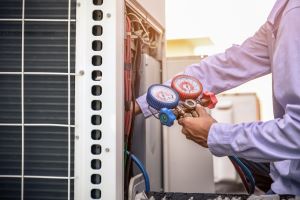Professional Maintenance Services by DMAKS HVAC For Your Needs.
Professional Maintenance Services by DMAKS HVAC For Your Needs.
Blog Article
Exactly How to Choose the Right HVAC System for Your Needs
Picking the appropriate a/c system is a crucial choice that calls for cautious consideration of various variables. Begin by assessing your home's dimension, format, and special demands, as these components determine the needed capacity and setup of the system. Additionally, developing a budget plan that incorporates setup and long-term functional costs is essential. As you consider your choices, recognizing energy performance scores and the implications of your regional climate will certainly play a significant function in your choice. Nonetheless, the myriad of system types available can complicate this process, leading one to ask yourself which path inevitably brings about optimal comfort and performance.
Examine Your Home Dimension
Assessing your home size is a vital primary step in choosing the proper HVAC system. The size of your home straight affects the heating and air conditioning ability required for effective climate control. A cooling and heating system that is also small will certainly struggle to maintain comfortable temperatures, causing raised power intake and endure the device. Alternatively, an oversized system can result in short cycling, inadequate humidity control, and inefficient operation.
To precisely examine your home size, measure the square footage of each area, considering aspects such as ceiling elevation and the design. Additionally, consider the insulation top quality and the variety of windows, as these components influence thermal efficiency. Homes with open flooring strategies may require various system setups contrasted to those with several split spaces.
Making Use Of the Handbook J load estimation technique can provide a more specific quote of your heating and cooling needs. This technique accounts for numerous aspects, consisting of regional environment, solar gain, and tenancy patterns. By thoroughly evaluating these facets, you can guarantee that your picked a/c system is appropriately sized, bring about improved convenience, energy performance, and durability of the devices.
Determine Your Budget Plan
Establishing your budget plan is a crucial action in the cooling and heating system choice procedure, as it sets the parameters for your alternatives - DMAKS HVAC. An a/c system is a significant investment, and recognizing your financial limitations will certainly help narrow down options that fit within your methods
Begin by evaluating not just the first purchase cost yet likewise installment costs, which can differ dramatically depending on the intricacy of the task. In addition, consider ongoing expenditures such as maintenance, repair services, and energy intake. A system may appear affordable originally yet can lead to higher costs in time if it is much less effective.
It is recommended to designate a backup fund for unanticipated expenditures that might emerge throughout installment or first system adjustments (DMAKS HVAC). Furthermore, check out financing options or refunds that may be available, as these can ease the concern of ahead of time prices
Ultimately, having a clear spending plan enables you to involve with heating and cooling experts better, guaranteeing you get tailored recommendations that aligns with your economic goals and home requirements. By being thorough concerning your budget, you can make informed decisions that improve convenience without endangering economic have a peek at this site security.
Evaluate Power Performance
Energy efficiency plays a vital duty in the overall efficiency and cost-effectiveness of your heating and cooling system. When picking a system, it is necessary to consider its energy efficiency scores, as these numbers directly affect your energy bills and ecological impact. Try to find systems with a high Seasonal Energy Effectiveness Proportion (SEER) for cooling and a high Annual Gas Application Efficiency (AFUE) score for heating. Greater rankings indicate higher effectiveness, meaning more comfort for much less power consumption.
Additionally, think about the Energy Star accreditation, which symbolizes that the system meets strict effectiveness standards set by the Epa. Spending in a Power Star-rated cooling and heating system can bring about substantial financial savings over time, particularly in Clicking Here areas with extreme temperature fluctuations.
Another factor to evaluate is the system's dimension and ability. An extra-large or undersized device can cause inefficiency and increased energy prices. DMAKS HVAC. Correct sizing, frequently determined through a Hand-operated J lots computation, makes sure that the system operates at optimal effectiveness


Take Into Consideration Environment and Environment
When selecting an a/c system, it is critical to consider the local climate and ecological problems, as these variables significantly influence the system's performance and efficiency. Various areas experience differing temperature level extremes, humidity levels, and seasonal modifications, all of which impact heating and cooling demands.

Additionally, local environmental variables, such as air high quality and potential allergens, ought to educate your selection. Solutions equipped with innovative filtration innovations can assist alleviate contaminants and offer cleaner air. In addition, think about the power sources offered in your area-- some HVAC systems are more reliable when powered by all-natural gas or renewable energy sources.
Eventually, straightening your a/c system selection with your local environment and ecological factors to consider will certainly result in boosted convenience, boosted performance, and reduced power expenses.
Explore System Types and Functions
As homeowners look for to maximize comfort and performance, discovering the various kinds of cooling and heating systems and their unique functions comes to be vital. The primary kinds of a/c systems consist of central air, heatpump, ductless mini-split systems, and heating site systems. Each system offers unique advantages customized to different needs and preferences.
Central air systems give uniform cooling throughout a home, making them suitable for larger areas. Heatpump work as both home heating and cooling down services, using power to move heat, which can lead to lower power prices. Ductless mini-split systems are ending up being progressively prominent due to their flexibility and ease of installation, allowing home owners to regulate the temperature in individual spaces without extensive ductwork.

Conclusion
To conclude, choosing the appropriate cooling and heating system requires mindful consideration of different aspects, consisting of home dimension, budget plan constraints, energy efficiency, local climate, and available system kinds. A detailed assessment of these aspects ensures optimum comfort and cost-effectiveness. By adhering to an organized method, house owners can make informed decisions that straighten with their details requirements and choices, inevitably leading to improved indoor air top quality and power cost savings.
Report this page